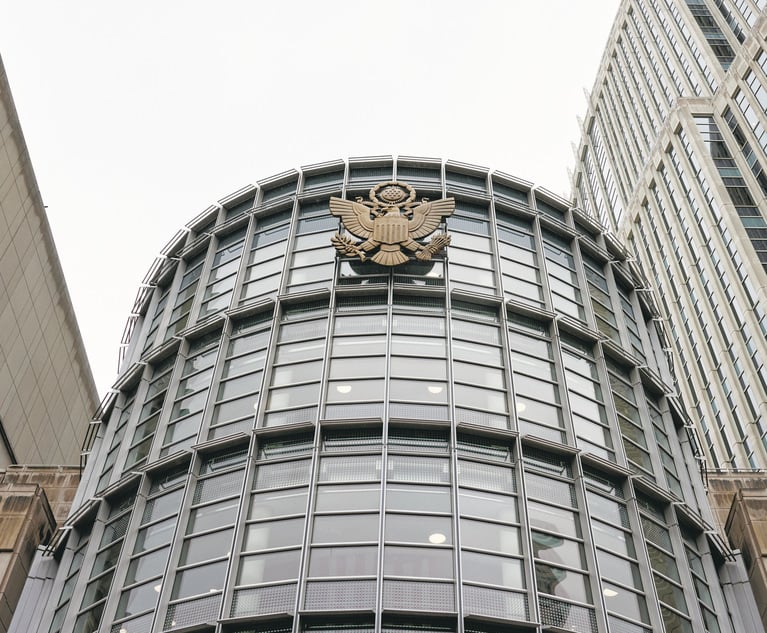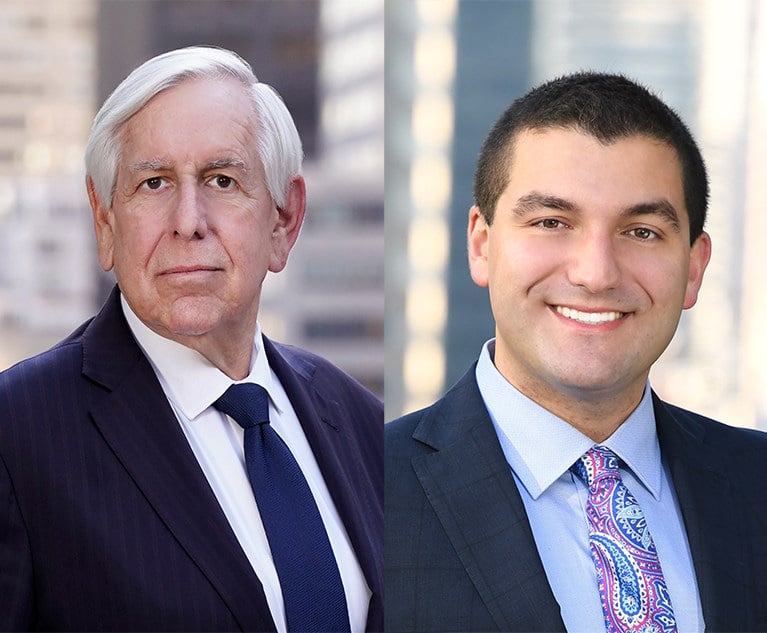Uniform Voidable Transactions Act Signed Into Law
On Dec. 6, 2019, Gov. Andrew Cuomo signed legislation modernizing New York's 95-year-old fraudulent conveyance law and making it consistent with the U.S. Bankruptcy Code and the law of at least 44 other states.
December 09, 2019 at 11:30 AM
7 minute read
 On Dec. 6, 2019, Gov. Andrew Cuomo signed legislation modernizing New York's 95-year-old fraudulent conveyance law and making it consistent with the U.S. Bankruptcy Code and the law of at least 44 other states. The Uniform Voidable Transactions Act (UVTA) primarily clarifies the rights and remedies of parties involved in transactions with financially distressed entities.
On Dec. 6, 2019, Gov. Andrew Cuomo signed legislation modernizing New York's 95-year-old fraudulent conveyance law and making it consistent with the U.S. Bankruptcy Code and the law of at least 44 other states. The Uniform Voidable Transactions Act (UVTA) primarily clarifies the rights and remedies of parties involved in transactions with financially distressed entities.
The UVTA replaces New York's current fraudulent conveyance law, Article 10 (§§270-281) of the Debtor and Creditor Law (the UFCA), which was enacted in New York in 1925. The UFCA was outdated and created conflicting and confusing case law that lead to an inordinate amount of expensive litigation, often inuring to the benefit of those who transferred assets in order to put them beyond the reach of creditors. Both the New York City Bar Association and the New York State Bar Association supported New York's adoption of the UVTA.
The new UVTA (§§271-281) provides remedies to creditors injured by a transfer of property or incurrence of an obligation (collectively, a "Transaction") that is (1) intentionally fraudulent because it was incurred with actual intent to hinder, delay or defraud creditors ("Intentionally Fraudulent") or (2) constructively fraudulent because it was exchanged for less than a "reasonable equivalent" by a financially distressed debtor ("Constructively Fraudulent").
The UVTA takes effect 120 days after its approval by the Governor (April 4, 2020). It will apply only to Transactions incurred on or after such date.
The UVTA made several notable changes to New York's fraudulent conveyance law, including:
Significant Procedural Changes
Shorter Statute of Limitations for Avoidance Actions. The UVTA shortens the time to challenge a Transaction from six years to four years. The UVTA also shortens to one year, the two-year discovery rule for Intentionally Fraudulent Transaction.
New York's prior six-year period was the longest state statute of limitations for "Avoidance Actions" in the country. This extended statute of limitations gave transferees greater uncertainty in the finality of their transactions and was not necessary to provide reasonable relief to potential creditor-plaintiffs.
Pleading Standards and Burdens of Proof Clarified. The UVTA makes the burden of proof of all claims and defenses a preponderance of the evidence. This changes the current application of a clear and convincing burden of proof required under the UFCA to establish Intentionally Fraudulent Transaction claims.
The UVTA also allocates the burden of proof on each element of the affirmative claim to the plaintiff and the burden of proof on most elements of affirmative defenses to the defendant.
Significant Substantive Changes
Good Faith as Element of Fair Consideration. The UVTA eliminates a provision of the prior UFCA that allowed a Transaction to be avoided as Constructively Fraudulent if it was received in bad faith, even if the transferee provided equivalent value in exchange. Under the UVTA, a transferee's intent is irrelevant as to the claim that a Transaction is voidable. The language of the UVTA mirrors that of the Bankruptcy Code.
The UFCA provided that a transfer made, or an obligation incurred may be avoided as a constructive fraudulent conveyance where (1) the transferor was insolvent or rendered insolvent as a result of the Transaction; and (2) the transferor did not receive "fair consideration" in exchange for the Transaction. The UFCA provided that "fair consideration" is received for property transferred or an obligation incurred "when in exchange for such property, or obligation, as a fair equivalent therefor, and in good faith, property is conveyed, or an antecedent debt is satisfied."
The new UVTA focuses on the overarching goal of fraudulent transaction law to protect creditors from the unfair diminution of a debtor's property. The underlying motivation of a transferee is not relevant to that goal.
Clarification of Insider Preferences. The UVTA adds a provision that renders voidable a Transaction by a debtor to an insider on account of an antecedent debt (i.e., even where there is an exchange of reasonable equivalent value) while the debtor was insolvent if the insider had reasonable cause to believe that the debtor was insolvent.
Case law developed under the UFCA to deem a Transaction with an insider lacking in good faith when the debtor was insolvent, on the theory that it allowed parties aware of the debtor's insolvency to prefer themselves to others by using the debtor's assets for repayment at the expense of creditors.
As one bankruptcy court examining this concept noted, there is really no explanation in the case law as to why there should be a presumption that insider Transactions lack good faith and noting that there is no such presumption for insider payments of salary. In re Direct Access Partners, 602 BR 495, 556 (Bankr. S.D.N.Y. 2019). By removing the good faith requirement as an essential element of "fair consideration," the UVTA applies a more logical rule and streamlines the analysis to whether the insider had "reasonable cause" to believe that the debtor was insolvent.
Other Changes
The UVTA also makes the following changes to current law:
Choice of Law. The UVTA applies the law of the place where the debtor/transferor is located when the Transaction occurs to assess the voidability of the Transaction. An organization is located at its place of business, or if it has more than one place of business, at its chief executive office. Previously, the choice of law rules applied a multi-factor test that often resulted in expensive litigation and produced unpredictable results.
Partnership Insolvency. The UVTA removes a provision of the UFCA applicable only to partnerships that made every Transaction with a partner while the partnership is insolvent voidable as to creditors of the partnership. Partnerships are now subject to the same provisions of the UVTA as other entities.
Badges of Fraud. The UVTA eliminates a provision of the UFCA that made Transactions without fair consideration by a defendant during pending litigation voidable as to the plaintiff in that litigation (but not other creditors) if the plaintiff obtained a judgment that was not satisfied. Under the UVTA such a Transaction is a "badge of fraud" that may be relied on, along with other factors, by all injured creditors (not just the plaintiff) to prove intent in an Intentionally Fraudulent Transaction claim.
Regularly Conducted Foreclosure of Real and Personal Property. Under the UVTA regularly conducted real property foreclosures and the exercise of remedies under Article 9 of the UCC with respect to personal property are protected from avoidance. Strict foreclosures, or situations where a secured creditor accepts property in satisfaction of a debt without a sale are still susceptible to avoidance.
Attorney Fees for Party Obtaining a Judgment Avoiding a Transaction. Finally, the UVTA allows courts to award attorney fees to a party who obtains a judgment setting aside a Transaction, whether it be Constructively Fraudulent or Intentionally Fraudulent. The UFCA permitted such fee awards only if a party established that a Transaction was Intentionally Fraudulent.
Conclusion
New York's adoption of the UVTA provides significant changes to its prior law governing debtor and creditor rights, giving parties more certainty when conducting business with financially distressed persons and entities. The modernized debtor and creditor law will allow New York's reputation as a center for commercial transactions to continue to flourish.
This content has been archived. It is available through our partners, LexisNexis® and Bloomberg Law.
To view this content, please continue to their sites.
Not a Lexis Subscriber?
Subscribe Now
Not a Bloomberg Law Subscriber?
Subscribe Now
NOT FOR REPRINT
© 2025 ALM Global, LLC, All Rights Reserved. Request academic re-use from www.copyright.com. All other uses, submit a request to [email protected]. For more information visit Asset & Logo Licensing.
You Might Like
View All
Disbarred NY Atty Receives 54-Month Prison Sentence After $3M Embezzlement
3 minute read
Unit Owners Sued Board for Failure To Maintain Adequate Fire Insurance: This Week in Scott Mollen’s Realty Law Digest


Trending Stories
Who Got The Work
J. Brugh Lower of Gibbons has entered an appearance for industrial equipment supplier Devco Corporation in a pending trademark infringement lawsuit. The suit, accusing the defendant of selling knock-off Graco products, was filed Dec. 18 in New Jersey District Court by Rivkin Radler on behalf of Graco Inc. and Graco Minnesota. The case, assigned to U.S. District Judge Zahid N. Quraishi, is 3:24-cv-11294, Graco Inc. et al v. Devco Corporation.
Who Got The Work
Rebecca Maller-Stein and Kent A. Yalowitz of Arnold & Porter Kaye Scholer have entered their appearances for Hanaco Venture Capital and its executives, Lior Prosor and David Frankel, in a pending securities lawsuit. The action, filed on Dec. 24 in New York Southern District Court by Zell, Aron & Co. on behalf of Goldeneye Advisors, accuses the defendants of negligently and fraudulently managing the plaintiff's $1 million investment. The case, assigned to U.S. District Judge Vernon S. Broderick, is 1:24-cv-09918, Goldeneye Advisors, LLC v. Hanaco Venture Capital, Ltd. et al.
Who Got The Work
Attorneys from A&O Shearman has stepped in as defense counsel for Toronto-Dominion Bank and other defendants in a pending securities class action. The suit, filed Dec. 11 in New York Southern District Court by Bleichmar Fonti & Auld, accuses the defendants of concealing the bank's 'pervasive' deficiencies in regards to its compliance with the Bank Secrecy Act and the quality of its anti-money laundering controls. The case, assigned to U.S. District Judge Arun Subramanian, is 1:24-cv-09445, Gonzalez v. The Toronto-Dominion Bank et al.
Who Got The Work
Crown Castle International, a Pennsylvania company providing shared communications infrastructure, has turned to Luke D. Wolf of Gordon Rees Scully Mansukhani to fend off a pending breach-of-contract lawsuit. The court action, filed Nov. 25 in Michigan Eastern District Court by Hooper Hathaway PC on behalf of The Town Residences LLC, accuses Crown Castle of failing to transfer approximately $30,000 in utility payments from T-Mobile in breach of a roof-top lease and assignment agreement. The case, assigned to U.S. District Judge Susan K. Declercq, is 2:24-cv-13131, The Town Residences LLC v. T-Mobile US, Inc. et al.
Who Got The Work
Wilfred P. Coronato and Daniel M. Schwartz of McCarter & English have stepped in as defense counsel to Electrolux Home Products Inc. in a pending product liability lawsuit. The court action, filed Nov. 26 in New York Eastern District Court by Poulos Lopiccolo PC and Nagel Rice LLP on behalf of David Stern, alleges that the defendant's refrigerators’ drawers and shelving repeatedly break and fall apart within months after purchase. The case, assigned to U.S. District Judge Joan M. Azrack, is 2:24-cv-08204, Stern v. Electrolux Home Products, Inc.
Featured Firms
Law Offices of Gary Martin Hays & Associates, P.C.
(470) 294-1674
Law Offices of Mark E. Salomone
(857) 444-6468
Smith & Hassler
(713) 739-1250






